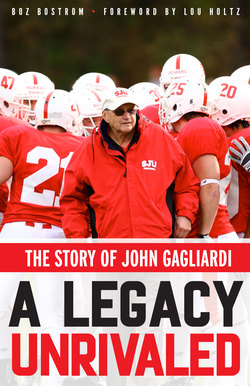Читать книгу A Legacy Unrivaled - Boz Bostrom - Страница 5
На сайте Литреса книга снята с продажи.
FOREWORD LOU HOLTZ
ОглавлениеLots of people can get into business, be successful, and make a lot of money. But when they die, their contribution ends. To have a significant, lasting impact, the key is to help other people be successful. Then your contribution lasts many a lifetime. Woody Hayes passed away about twenty years ago, but he still lives on because of the values and virtues he instilled in his players and coaches, including me.
When I was a junior in high school, floundering in the lower half of my class, my coach told my parents I should go to college and be a coach. I had worked to save my money to buy a 1949 Chevrolet. My parents said I would use that money to go to college. I said no, my parents said yes, and so we compromised and I went to college. It was the wisest decision I ever made. Coaching can be a demanding profession, but it’s also one of the most rewarding.
Early in my career, I studied why certain coaches were so successful in not only winning but also in influencing young people to be successful. Some coaches I studied were Bear Bryant (Alabama), Darrell Royal (Texas), Frank Broyles (Arkansas), Rip Engle (Penn State), Forest Evashevski (Iowa), John McKay (Southern Cal), and Ara Parseghian (Notre Dame). But the one name that kept coming up in conversations on great coaches was John Gagliardi from Saint John’s, a little school in Minnesota.
When I studied his record, I was amazed at the success he achieved year after year. It was difficult to learn a great deal about him because he wasn’t in the national news on a daily basis. What I have found since I entered coaching is that it is just as difficult to achieve success at Saint John’s as it is at Alabama, Notre Dame, or any other major school. And this is why Coach John Gagliardi’s success caught my imagination.
It wasn’t until I was named the head coach at the University of Minnesota in 1984 that I got the chance to spend some personal time with John. It didn’t take me long to realize he was a national treasure. Yes, I heard many positive things about him from his former players, the media, and people on the street, but they didn’t talk about his amazing win-loss record and the numerous championships he had won. Instead they talked about his leadership, his morale, his values, and the impact he had on players, students, faculty, and virtually everyone who knew him.
I never passed up the chance to spend time with John at the various events we both attended. His philosophy was different. He didn’t scrimmage, he seldom practiced his team in pads—yet he won. There are many different ways to win, and John exemplified this. He is a legend not because of his win-loss record, but because of his values. The coaching class he teaches—which is just as much about winning in life as it is about winning in football—is the most popular course on campus.
John Gagliardi is a person we can all learn from. Not only will you enjoy reading this book, you will be a better person for having done so. John is a person I admire and respect as much as the great coaches I mentioned earlier. I’m thankful I got to know him personally, and I’ve certainly benefited from our relationship.
To know a person’s true value, ask these questions: If they didn’t show up, who would miss them and why? There aren’t many people we would miss more than John had he not shown up. As you read his story in A Legacy Unrivaled, you will soon realize why I admire and respect him so much.
